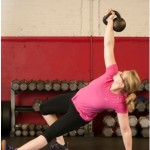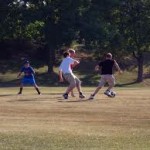Dr. Toby Brooks serves at the Director of Research and Education for the IYCA. Brooks is also currently an Assistant Professor in the Master of Athletic Training Program at the Texas Tech University Health Science Center in Lubbock, TX. What’s your background? PhD & MS in Physical Education from University of Arizona, BS in Athletic Training from Southern Illinois University. 10+ years experience in athletic training & strength and conditioning at professional, collegiate, and high school levels. Owned and operated sports performance business in Southern Illinois for three years prior to accepting academic position at Texas Tech. Three year.. More »
IYCA Member Spotlight: Jim Kielbaso
Jim Kielbaso MS, CSCS is the Director of the Total Performance Training Center and author of Utlimate Speed & Agiity as well as creator of the IYCA’s Ultimate Speed Drills and Ultimate Speed Mechanics resources. He is a former college strength coach and has trained thousands of athletes at every level of competition. Q: What’s your background? A: I am a former college strength coach and the author of the book Ultimate Speed & Agility. I have a BS in Exercise Science from Michigan State and an MS in Kinesiology from the University of Michigan. I have been.. More »
Fitness Is the Way to Life
Fundamentals of Youth Fitness Training “Fitness Is the Way to Life” by Leonard M. Framson PT, MFS, CSCI, YFT, CFNC, YFS Children can start weight training at any age as long as there is proper supervision, the youth has been educated in the proper technique, and the equipment being used is adaptable to their size and shape. There are programs out there that involve training children as young as 7 years old that have found that they responded favorably physiologically with certain gains in muscle strength, muscle mass, and power, as well as exercise performance. It also helped to.. More »
Your Comfort Bears No Fruit
Alex Slezak – M.Ed, YFS, YSAS, HSSCS I have been very fortune to have met and been mentored by many world-class tennis coaches. On a recent visit to what I believe is one of the best junior tennis training facilities in the world, the Junior Tennis Champions Center in College Park, MD, I heard Coach Chuck Kriese saying repeatedly, “your comfort bears no fruit.” Now I was really interested in this saying because when it was said to young athletes they seemed to work harder. Interesting isn’t it? There have been all kinds of books like The Talent Code and.. More »
Speed & Agility Training to Improve Sport Performance
Speed and Agility Training To Improve Sports Performance by Todd Durkin Speed kills. Speed and agility training in sport gives an athlete an edge on his/her competition. And the great news is that it can all be learned through technique training, proper drills, and hard work. If you’re wanting and willing to get faster, let’s dive (or sprint!) into the action. In this article, you will learn all about improving your speed and agility training. You will learn about stride rate, stride length, and proper running mechanics. You will learn several different speed improvement training drills, exercises, and programs that.. More »
Kettlebell Shoulder Stabilization Exercises for Athletes: Part 2

Kettlebell Exercises for Athletes: Heavier Isn’t Always Better By Pamela MacElree, MS I hope you were able to test out the arm bar and the high windmill that I went over with you in the previous post on kettlebell shoulder stabilization exercises for athletes. If you were new to these exercises, did you notice the drastic difference in the amount of weight you initially thought you might be able to do the exercise with and the weight you could comfortably control? Don’t worry! After some serious practice, you should be able to start moving up in weights. Kettlebell Shoulder Stabilization.. More »
Kettlebell Shoulder Stabilization Exercises for Athletes: Part 1

Heavier Isn’t Always Better with Shoulder Stabilization Exercises for Athletes By Pamela MacElree, MS With certain exercises for athletes, heavier isn’t always better. EEK! Did I really just write that for everyone to see? Coming from someone who constantly talks about picking up more weight, this might seem like a partial shock to you. The truth of it is that some kettlebell exercises are better served with lighter to moderate weight, especially while learning them. There are 4 really awesome kettlebell exercises for athletes that will help increase shoulder stabilization. The unique thing about these kettlebell exercises is that we’re working.. More »
Are We Really Getting Stronger?

Is Your Youth Strength Training Program All Hype? By Mike McGurn All sports I can think of require basic strength levels, and strength training has recently become a much sought after attribute in the athletic community. Kinesiologists, physiologists, athletic trainers, and professional strength coaches all tell us that if all we did was increase muscular strength by 35-40% in an athlete without changing any of the other attributes needed for the sport, there will be a definite improvement in performance levels. The doubters may disagree and question how getting stronger can be of benefit in sports where the technique is.. More »
Drinking Water From a Fire Hose

By Alex Slezak M.Ed, YFS, YSAS, HSSCS Remember the hot summer days, before we knew what BPAs were, when you would turn the garden hose water on in the backyard and let it slowly trickle out to get a drink? Every once in a while, my friends would crank the water on full blast while I was drinking it and get a good laugh! I hope the title Drinking Water From a Fire Hose gives you an even better visual and maybe makes you crack a smile just thinking of it. But what I have to say next is actually.. More »
Loading For High School Weight Training

By Wil Fleming Much of the time spent in the weightroom will be dedicated to the coaching of athletes on the proper movements, positions, and providing general technical info needed to safely complete the movements with maximal return on the time invested. The other portion of the time of the strength coach will be spent on determining and helping to select the weights that athletes use. The beginning stages of the high school athletes‘ career in the weightroom should be spent teaching athletes the right way to lift and train, cueing the right movements, and ensuring technical proficiency. Building these.. More »
Grieving the Loss of Free Play

By Phil Loomis Do you recall the days of your childhood when you would meet your friends outside in the morning and play all day long? You made up teams and played tag, baseball, and dodge ball, capture the flag whatever you felt like that day. It was unstructured and while there may have been rules you and your friends made them up to suit your particular situation. Many “experts” are lamenting the lack of free play in current society. “Remarkably, over the last 50 years, opportunities for children to play freely have declined continuously and dramatically in the United.. More »
FMS and Kids

By Jared Woolever of Smart Group Training Does the Functional Movement Screen (FMS) work with kids? Both Steve and I were lucky enough to attend the IYCA Summit (International Youth and Conditioning Association) recently. We have been to the past three now, and we are pleased with the direction this organization is heading. This year, however, we were lucky enough to have a booth set up. We were able to talk and interact with all the coaches, trainers, and educators. The question we heard the most has to be about the FMS and its application to children. Does it actually.. More »
Coaching: Art or Science?

By Alex Slezak – M.Ed, YFS, YSAS, HSSCS Let me begin by posing a question for you to ponder aimed at the core of your coaching philosophy. Is training young athletes to get bigger, faster, and stronger a sports science or an art form? Do you believe the science, research or training methods are most important? Or do you believe that the art of coaching and working with youth is more important than any science or training methods? I have spent the past 9 years of my life training youth of all ages and athletic backgrounds in my physical education.. More »
Identify the Goal of a Training Program

By Wil Fleming Know the goal of your program Knowing the starting point of a training program is only part of the equation. A clear goal of a training program you are designing must be laid out. If we go back to our marathon metaphor, the finish line must be clearly marked. If no finish line is marked you may not run the entire distance, or you and your athlete might cruise right by the finish line without ever stopping to look at your time and results. Defining the goal of a training program means that you now have.. More »
8 Ways To Get More From Your Team Training Sessions

Having worked with dozens of coaches over the years, I know that every single one of them wants nothing but the best for their players. They are typically consumed by the desire to get an extra edge for their kids that will put them ahead of their peers. And it eats at them to see one of their kids go down with a serious injury, especially if they feel it could have been prevented. Today, the dream for many sports coaches is to give their kids that edge by having a great off-season program, a development system that plays a.. More »
Misuse Of Speed and Agility Drills

Coaching Mistakes With Speed And Agility For Athletes Training Alot of people in this field call themselves Strength & Conditioning Coaches. I don’t have a problem with the “Strength” part of the title, but the “Conditioning” part could use a little work. As a former college S & C Coach, I fully understand the time constraints of the collegiate or high school environment. Running a private facility for athletes, I also understand the limitations of this situation. In both cases, it is very difficult to give every athlete the time and instruction they need. Still, there is one area of.. More »
Do You Have All The Answers?

By Phil Hueston, NASM-PES; IYCA-YFS “And again I say unto you, It is easier for a camel to go through the eye of a needle, than for a rich man to enter into the kingdom of God.” – Matthew 19:24 Usually when a writer begins a piece with a Bible quote, the eyes of his readers roll and the “here we go” mutterings begin. Stop it. Stop it now. There is deep wisdom to be found in the writings of the Bible, whether you are a believer or not. After all, the Golden Rule we all teach our kids is.. More »
Pre-Tournament Nutrition With Dr. Chris Mohr

By Chris Mohr Q: What foods should you eat to start your day when you are going to play in an all day tournament? A: First, I’ll assume that you’re planning to wake up early enough to have something somewhat substantial and are not just rolling out of bed and running out the door. When you’re preparing for several games during the day. If you read nothing else, pay attention closely to this … Stick with what you know and don’t try new foods on the day of competition. Or even the day before competition. I once worked with a.. More »
Flexibility and Mobility for Young Athletes

Flexibility vs. Mobility in Youth Fitness Programs By Mike Robertson What is the difference between Flexibility and Mobility? I’ve always used the Bill Hartman definitions; they go something like this: Mobility – Range of motion under specific circumstances (specific) Flexibility – Range of motion about a joint (non-specific) As you can see, mobility is specific to a certain movement-i.e., you need a certain amount of hip mobility to squat, lunge, etc. In contrast, flexibility is non-specific-i.e. you lay someone on their back and stretch their hamstrings. This gives you an idea of their flexibility, but it’s not specific. Just because.. More »
Know What’s In Their Backpack

By Joseph Hartigan, CSCS, YFS We as coaches have a bigger responsibility to our athletes than to simply deliver a great training session. We are in a unique profession that gives us a platform to influence children for a lifetime and not only groom athletes but build great character. One of the easiest ways to have an influence over these impressionable minds is to coach with empathy or what we call know what’s in their backpack. Now I’m sure that plenty of your athletes drag their backpacks from school into your facility but that’s not what we’re talking about. What.. More »
